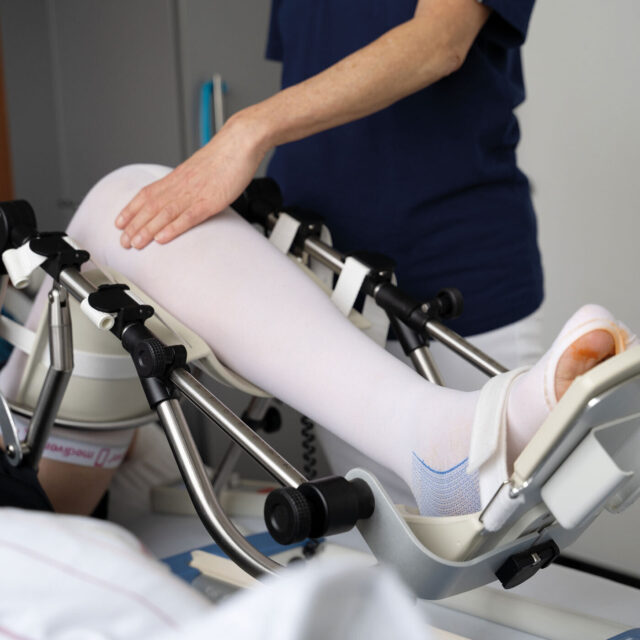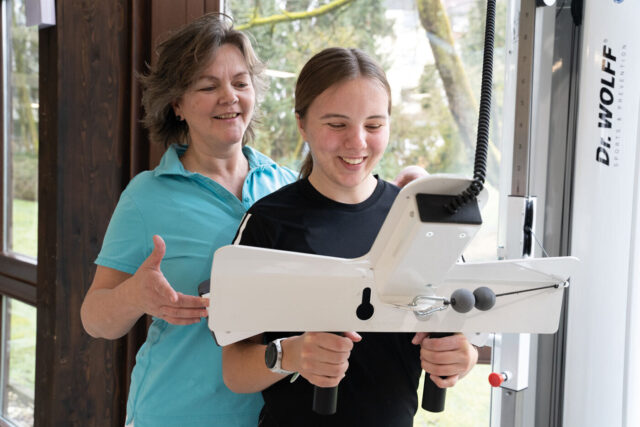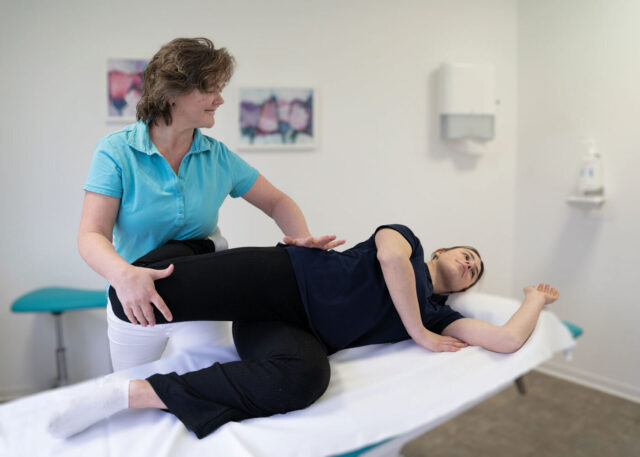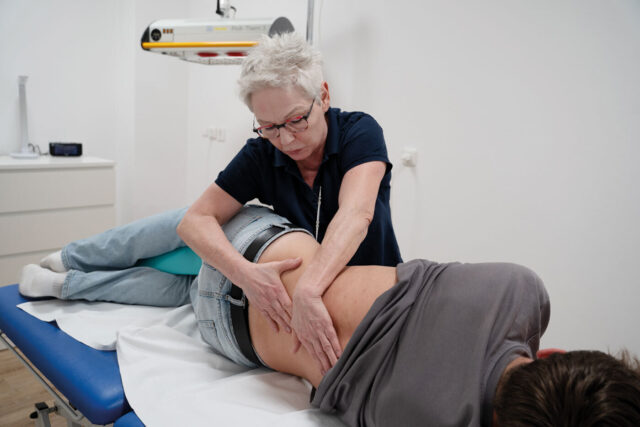With professional expertise and heart, we improve quality of life.
This is how #TeamPhysio supports patients at the Sportklinik Hellersen
Have article read aloud
Die Physiotherapie der Sportklinik Hellersen ist die erste Anlaufstelle für Patienten, die nach einer Operation, bei chronischen Beschwerden oder im Rahmen einer ambulanten Therapie Unterstützung suchen. Unter der Leitung von Axel Hellner sorgt das 20-köpfige Team dafür, dass jeder Patient genau die Behandlung erhält, die er braucht, um schnell wieder fit zu werden. Dabei steht die individuelle Betreuung im Vordergrund, um die Lebensqualität der Patienten zu verbessern. Das Team arbeitet eng zusammen und passt die Therapie gezielt an die jeweiligen Bedürfnisse der Patienten an – immer mit dem Ziel, eine zügige und effektive Genesung zu ermöglichen.
The physiotherapy department at Sportklinik Hellersen is the first point of contact for patients seeking support after surgery, for chronic conditions, or as part of outpatient therapy. Under the direction of Axel Hellner, the 20-strong team ensures that every patient receives exactly the treatment they need to get back on their feet quickly. The focus is on individual care to improve the quality of life of patients. The team works closely together and tailors the therapy to the specific needs of each patient – always with the aim of enabling a speedy and effective recovery.
Divided into three areas, the physiotherapy department at Sportklinik Hellersen offers tailor-made treatment approaches for the different requirements of patients. The first area, post-operative physiotherapy, focuses on providing patients with rapid and targeted care after surgery. The emphasis here is on pain relief and gentle mobilization to promote healing and quickly restore mobility. The second area, inpatient physiotherapy, is specifically designed for patients who have not undergone surgery. It offers targeted support for people with orthopedic complaints or chronic pain within the framework of conservative orthopedics and special pain medicine who have been admitted to the Sportklinik Hellersen as inpatients. Here, individual treatment approaches are used to ensure that pain is relieved in the long term and mobility is improved step by step. The range of services is rounded off by outpatient physiotherapy, which enables particularly flexible and individually tailored care – without the need for an inpatient stay.

“The therapy is based on specially developed, standardized programs that were created in close cooperation with the chief physicians.”
Dirk Vollmann
Deputy Head of Therapy
You’re not alone – our team is here for you, with both expertise and compassion.
Postoperative physical therapy: Early mobilization for a quick recovery
In order to promote the healing process in the best possible way, post-operative physiotherapy focuses on immediate and targeted care after surgery. Treatment does not begin after a few days, but rather with the first mobilization. This early intervention is crucial for quickly restoring patients' mobility and optimizing the healing process. Here, a team of six specialists helps patients get back on their feet quickly.
“The therapy is based on specially developed, standardized programs that were created in close cooperation with the chief physicians,” explains deputy therapy director Dirk Vollmann. These programs are stored in the clinic software, allowing the attending physician to access the appropriate measures. There is a defined standard program for each diagnosis, which is requested individually. If adjustments are necessary in individual cases, these are discussed with the attending physicians and the entire team to ensure that the therapy is tailored precisely to the patient's needs.
Another important part of therapy planning is regular visits. The entire interdisciplinary team—consisting of doctors, nurses, and physical therapists—talks with the patient together. This gives everyone involved the opportunity to document progress, review therapy goals, and make any necessary changes at short notice. “This close cooperation ensures that each patient receives individual care and the best possible support on their road to recovery,” says Axel Hellner, emphasizing the importance of collaboration within the interdisciplinary team.
For Dirk Vollmann and his team, working in the inpatient ward is more than just a job—it is a challenge that is also incredibly motivating. “It is incredibly rewarding to help people during this crucial phase of their recovery—and that is why we do this job,” he explains.
“This close collaboration ensures that each patient receives individual care and the best possible support on their road to recovery.”
Axel Hellner
Head of Physiotherapy
Inpatient physical therapy: Individual and group therapy for orthopedic and pain patients
Inpatient physiotherapy in House 2 is provided for patients from conservative orthopedics and special pain medicine. Treatment includes both individual and group therapies that are tailored to the individual needs of each patient. The three-person team of therapists professionally implements the therapy units prescribed by the doctors and accompanies patients on their journey to greater mobility and freedom from pain.

Outpatient physical therapy: Long-term care for a better quality of life
Whether after an injury, an operation or for musculoskeletal complaints, outpatient physiotherapy at Sportklinik Hellersen helps patients regain their mobility quickly. With individually tailored therapy and training concepts tailored to the patient's specific condition and performance level, the experienced team of eight physiotherapists and two staff members ensures effective and targeted treatment. “Unlike conventional practices, we are specialists in orthopedics and surgical sports traumatology,” emphasizes Susanne Böning, technical director of outpatient physiotherapy. Axel Hellner adds: ”Our strength lies in the specialized follow-up treatment of procedures that are performed here on an outpatient basis. We are able to provide optimal care for these patients.”
However, outpatient physiotherapy at Sportklinik Hellersen is not only available to patients who have undergone surgery. Outpatients with chronic complaints or acute orthopedic problems also find competent support here, regardless of which doctor issues the corresponding prescription. The wide range of therapies includes various types of fascia therapy, trigger point therapy, and manual therapy, which enable targeted and individually tailored treatment. In addition, the team offers specialized support in neurological therapies such as PNF (proprioceptive neuromuscular facilitation), for which three therapists are specially qualified.
The offer includes both individual treatments and small group training sessions on medical training equipment. This ensures that personal support is always guaranteed: expert physiotherapists create individual training plans, monitor the exercises, and continuously adapt them to the progress of the patients.

Support every step of the way Recovery
The physiotherapy department at Sportklinik Hellersen offers patients comprehensive care ranging from acute treatment to long-term aftercare. While inpatient care focuses on intensive support immediately after surgery, outpatient care offers the opportunity to treat patients over a longer period of time – often several months. “Someone who has had a knee or hip replacement, for example, often only stays in the inpatient ward for a few days. In outpatient therapy, however, we accompany these patients for six months and thus experience the entire healing process much more intensively,” explains Susanne Böning, who has been working at Sportklinik Hellersen for 34 years. This close support not only creates a special relationship with the patients, but also allows us to respond specifically to progress and improve their quality of life in the long term.
Patients often begin treatment before surgery, for example due to pain or restricted movement. After surgery and subsequent rehabilitation, many return to outpatient therapy at Sportklinik Hellersen to continue their follow-up treatment. “Some patients even go through all three stages: conservative therapy, inpatient treatment, and outpatient physiotherapy,” explains Axel Hellner.
Always up to date with further training
Continuing education and ongoing exchange are crucial in physical therapy in order to keep pace with the latest developments. “Our profession is very training-intensive because new findings and methods are constantly emerging. You simply have to keep up,” explains physiotherapist Susanne Böning. That's why #TeamPhysio uses a variety of sources – from trade journals and studies to regularly attended training courses – to continuously develop their skills. Follow-up treatment concepts are also regularly reviewed and compared with approaches from other clinics in order to optimize our own procedures. “Especially in rare or complex cases, we conduct intensive research and tailor our concepts to provide the best possible therapy,” she adds.
A central component of the training courses is direct exchange with colleagues from other practices and clinics, which provides new perspectives and impetus for one's own work. “Training courses enable us to learn about new approaches and share experiences that enrich our work,” explains Susanne Böning: “Therapy concepts are constantly evolving, so it is important to remain open to new methods.” Colleague Dirk Vollmann aptly adds: “You have to keep your finger on the pulse.”
“It is important to set realistic goals for patients that are achievable so that there is no disappointment and no unrealistic promises are made.”
Axel Hellner
Head of Physiotherapy

From setbacks to progress and a better quality of life
Relapses are also part of the healing process and are an emotional setback for many patients. In such moments, according to #TeamPhysio, it is important to analyze the causes, adjust the therapy, and encourage the patient. Open communication and a realistic view of progress strengthen trust and enable everyone to continue working together. “Even with chronic pain patients, there is always something that can be done to make life easier,” explains Susanne Böning. “Sometimes it's about maintaining the best possible quality of life. Small steps forward are often just as valuable, and patients appreciate that.” Axel Hellner adds: “It is important to set realistic goals for patients that are achievable so that there is no disappointment and no unfulfillable promises are made.”
It is an incredible feeling for the entire team to see a patient smile again after a difficult operation because they have made progress. “And that is the real reward—knowing that you are helping people improve their quality of life. That is exactly what makes working in physical therapy so fulfilling,” emphasizes Dirk Vollmann.
“And that's the real reward—knowing that you're helping people improve their quality of life. That's what makes working in physical therapy so fulfilling.”
Dirk Vollmann
Deputy Head of Therapy



























